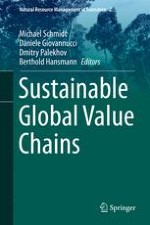2019 | OriginalPaper | Buchkapitel
14. Clarity in Diversity: How the Sustainability Standards Comparison Tool and the Global Sustainable Seafood Initiative Provide Orientation
verfasst von : Friederike Sorg, Jens Kahle, Niklas Wehner, Max Mangold, Silke Peters
Erschienen in: Sustainable Global Value Chains
Verlag: Springer International Publishing
Aktivieren Sie unsere intelligente Suche, um passende Fachinhalte oder Patente zu finden.
Wählen Sie Textabschnitte aus um mit Künstlicher Intelligenz passenden Patente zu finden. powered by
Markieren Sie Textabschnitte, um KI-gestützt weitere passende Inhalte zu finden. powered by
